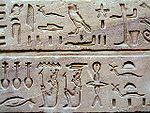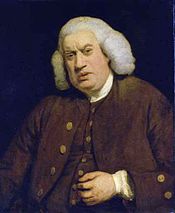- Linguistic prescription
-
Linguistics 
Theoretical linguistics Cognitive linguistics
Generative linguistics
Functional theories of grammar
Quantitative linguistics
Phonology · Graphemics
Morphology · Syntax · Lexis
Semantics · PragmaticsDescriptive linguistics Anthropological linguistics
Comparative linguistics
Historical linguistics
Phonetics · Graphetics
Etymology · SociolinguisticsApplied and
experimental linguisticsComputational linguistics
Evolutionary linguistics
Forensic linguistics
Internet linguistics
Language acquisition
Language assessment
Language development
Language education
Linguistic anthropology
Neurolinguistics
Psycholinguistics
Second-language acquisitionRelated articles History of linguistics
Linguistic prescription
List of linguists
Portal In linguistics, prescription denotes normative practices on such aspects of language use as spelling, grammar, pronunciation, and syntax. It includes judgments on what usages are socially proper and politically correct. Its aims may be to establish a standard language, to teach what is perceived within a particular society to be correct forms of language, or to advise on effective communication. If usage preferences are conservative, prescription might (appear to) be resistant to language change; if the usage preferences are radical, prescription may produce neologisms.[1][page needed]
Prescriptive approaches to language, concerned with how the prescriptivist recommends language should be used, are often contrasted with the alternative approach of descriptive linguistics, which observes and records how language actually is used.[2] The basis of linguistic research is text (corpus) analysis and field studies, both of which are descriptive activities; but description includes each researcher’s observations of his or her own language usage. Despite apparent opposition, prescription and description can inform each other,[1][page needed] since comprehensive descriptive accounts must take into account speaker attitudes, while some understanding of how language is actually used is necessary for prescription to be effective.
Contents
Aims
The main aims of linguistic prescription are to define standardized language forms either generally (what is Standard English?) or for specific purposes (what style and register is appropriate in, for example, a legal brief?) and to formulate these in such a way as to make them easily taught or learned.[3] Prescription can apply to most aspects of language: spelling, grammar, semantics, pronunciation and register. Most people would agree that in all of these areas it is meaningful to describe some usages as, at least, inappropriate in particular contexts. One main aim of prescription is to draw workable guidelines for language users seeking advice in such matters.
Standardized languages are useful for interregional communication: speakers of divergent dialects may understand a standard language used in broadcasting more readily than they would understand one anothers' dialects. It can be argued that such a lingua franca, if needed, will evolve by itself, but the desire to formulate and define it is very widespread in most parts of the world. Writers or communicators who wish to use words clearly, powerfully, or effectively often use prescriptive rules, believing that these may make their communications more widely understood and unambiguous.
A complementary aim of linguistic prescription may be the imposition of a political ideology. During the second half of the 20th century, politically motivated linguistic prescription recommended by various advocacy groups had considerable influence on language use in the context of political correctness, imposing special rules for anti-sexist, anti-racist or generically anti-discriminatory language (e.g. "people-first language" as advocated by disability rights organizations). George Orwell in Politics and the English Language (1946) criticized the use of euphemisms and convoluted phrasing as a means of hiding insincerity. Orwell's fictional "Newspeak" (1949) is a parody of ideologically motivated linguistic prescriptivism.
Authority
Prescription presupposes an authority whose judgment may be followed by other members of a speech community. Such an authority may be a prominent writer or educator such as Henry Fowler, whose English Usage defined the standard for British English for much of the 20th century.[4] The Duden grammar (first edition 1880) has a similar status for German. Although dictionary makers often see their work as purely descriptive, their dictionaries are widely used as prescriptive authorities by the community at large. Popular books such as Lynne Truss's Eats, Shoots & Leaves, which argues for stricter adherence to prescriptive punctuation rules, have phases of fashion and are authoritative to the extent that they attract a significant following.
In some language communities, linguistic prescription is regulated formally. The Académie française (French Academy) in Paris is an example of a national body whose recommendations are widely respected though not legally enforceable. In Germany and the Netherlands, recent spelling reforms were devised by teams of linguists commissioned by government and were then implemented by statute.
Other kinds of authorities exist in specific settings, such as publishers laying down a house style which, for example, may either prescribe or proscribe particular spellings or grammatical forms, such as a serial comma.
Examples of prescriptive bodies include:
- The Académie française (French Academy, 1635) is the national language-governing academic body whose recommendations, though legally unenforceable, are respected for maintaining standard French.
- The Canadian province of Québec, where French is perceived to be particularly threatened by the incursion of English, has its own Office québécois de la langue française.
- The German-speaking nations (Germany, Austria, Liechtenstein, Switzerland) established national, normative spelling usages for their respective varieties of the language, by statute with the German orthography reform of 1996 (Rechtschreibreform). This reform has remained so controversial that in a plebiscite in Schleswig Holstein in 1998, the vast majority of voters decided that the reform was not to be executed in the Federal State; however the Schleswig-Holstein parliament overruled that in 1999. Many major German newspapers chose to implement the reform only in part (e.g. Axel Springer AG, Der Spiegel) or not at all, ending a period where unified German spelling (German: Rechtschreibung), although officially only mandatory in government and educational use, was the de facto standard in German spelling.
- In the Netherlands, standardized spelling norms were compulsory for Dutch government publications — yet popular and mass communications media language applied an adapted spelling reform, see Wordlist of the Dutch language and the White Booklet.
- During the era of the Soviet Union (1917–91) the Union of Soviet Writers (Soyuz Sovetskikh Pisatelei, 1932) policed the Russian language with prescriptive linguistics to establish a standardized Soviet (Russian) language.
- The standard of Spanish is maintained in 21 countries by the Real Academia Española (Royal Spanish Academy, 1713) in affiliation with the Association of Spanish Language Academies (Asociación de Academias de la Lengua Española, 1951).
- The Albanian standard language (the Tosk variety) is regulated by the Social Sciences and Albanological Section of the Academy of Sciences of Albania.
Origins
Historically, linguistic prescriptivism originates in a standard language when a society establishes social stratification and socio-economic hierarchy, in which instance, the spoken and written language usages of the authorities (state, military, church) are preserved as the standard language to emulate for social success; see social class. To distinguish itself from contemporary colloquial language, standard language usage includes archaisms and honorific colours. Like-wise, the style of language used in ritual also differs from quotidian speech.[5]
When a culture develops a writing system, the prescriptive linguistics that established (codified) the standard spoken language then establishes the standard written language for less ambiguous communications — given the absence of conversation, i.e. the speaker and his or her facial and body language, which reduces ambiguity in spoken language. The codification of written speech is achieved with a grammar establishing the parts of speech, register, diction, et cetera. Literacy (an alphabet), usually was propagated by religion; Western Christianity propagated the Latin alphabet; Eastern Orthodoxy, the Greek and Cyrillic alphabets; Judaism, the Hebrew alphabet, Islam, the Arabic alphabet, and Hinduism, the Devanagari script;[6] and in China, the Han character logograms are the standard writing language, and from which derive the Japanese writing system. Furthermore, the establishment of a prescribed (standard) language is supported by the political economy of the publishing business, wherein books represent a sunk cost, thus, changes in written language usage are an economic hazard that might render them obsolete, hence does writing promote the preservation of archaic usages; see Literary language.
 Standard language: Ptolemaic hieroglyphics from the Temple of Kom Ombo.
Standard language: Ptolemaic hieroglyphics from the Temple of Kom Ombo.
Linguistically, a government bureaucracy tends to prescriptivism (standardized language) for functional continuity, thus each bureau uses a prescribed (standard) language. In this respect, official publications (i.e. writs), established the precedent usages that are “bureaucratese”, the language of bureaucrats.[7] Such prescriptivism dates from ancient Egyptian (ca. 3400 BC), wherein bureaucrats preserved the spelling of the Middle Kingdom of Egypt (2080–1640 BC ) into the Ptolemaic period (305–30 BC) in the standard usage of Egyptian hieroglyphics.[8]
The language of a society, therefore, is a stylistic continuum, wherein privileged language, used in legal, military, and religious ceremony, is valued above regional varieties and local dialects. When the valuation of usage is very marked, the discontinuity between the high style (standard) and the low style (vernacular) of a language, there arises diglossia (two tongues), in which instance the privileged language requires formal study to master, and is not readily intelligible to the untutored, who only speak, read, and write the vernacular. Given the effort required for mastery, a writer who has mastered Chinese calligraphy or English spelling might resist its devaluation via (over-) simplification.[9]
Sources
From the earliest attempts at prescription in classical times, grammarians have observed what is in fact usual in a prestige variety of a language and based their norms upon this. Modern prescription, for example in school textbooks, draws heavily on the results of descriptive linguistic analysis. Because prescription is generally based on description, it is very rare for a form to be prescribed which does not already exist in the language.
However, prescription also involves conscious choices, privileging some existing forms over others. Such choices are often strategic, aimed at maximising clarity and precision in language use. Sometimes they may be based on entirely subjective judgments about what constitutes good taste. Sometimes there is a conscious decision to promote the language of one class or region within a language community, and this can become politically controversial—see below.
Sometimes, prescription is motivated by an ethical position, as with the prohibition of swear words. The desire to avoid language which refers too specifically to matters of sexuality or toilet hygiene may result in a sense that the words themselves are obscene. Similar is the condemnation of expletives which offend against religion, or more recently of language which is not considered politically correct.[10]
It is sometimes claimed that in centuries past, English prescription was based on the norms of Latin grammar, but this is doubtful. Robert Lowth is frequently cited as one who did this, but, in fact, he specifically condemned "forcing the English under the rules of a foreign Language".[11] It is true that analogies with Latin were sometimes used as substantiating arguments, but only when the forms being thus defended were in any case the norm in the prestige form of English.
Problems
While many people would agree that some kinds of prescriptive teaching or advice are desirable, prescriptivism is often subject to criticism. Many linguists, such as Geoffrey Pullum and other posters to Language Log, are highly skeptical of the quality of advice given in many usage guides, including highly regarded books like Strunk and White's Elements of Style.[12] In particular, linguists point out that popular books on English usage written by journalists or novelists (e.g. Simon Heffer's Strictly English : the correct way to write ... and why it matters) often make basic errors in linguistic analysis.[13][14]
One problem is that prescription has a tendency to favour the language of one particular region or social class over others, and thus militates against linguistic diversity.[15] Frequently, a standard dialect is associated with the upper class, as for example Great Britain's Received Pronunciation. RP has now lost much of its status as the Anglophone standard, being replaced by the dual standards of General American and British NRP (non-regional pronunciation). While these have a more democratic base, they are still standards which exclude large parts of the English-speaking world: speakers of Scottish English, Hiberno-English, Australian English, or African-American Vernacular English may feel the standard is slanted against them.[16][17] Thus prescription has clear political consequences. In the past, prescription was used consciously as a political tool; today, prescription usually attempts to avoid this pitfall, but this can be difficult to do.
A second problem with prescription is that prescriptive rules quickly become entrenched and it is difficult to change them when the language changes. Thus there is a tendency for prescription to be excessively conservative. When in the early 19th century, prescriptive use advised against the split infinitive, the main reason was that this construction was not in fact a frequent feature of the varieties of English favoured by those prescribing. The prescriptive rule was based on a descriptive observation. Today the construction has become common in most varieties of English, and a prohibition is no longer supported by observation. However, the rule endured long after the justification for it had disappeared. In this way, prescription can appear to be antithetical to natural language evolution, although this is usually not the intention of those formulating the rules.
A further problem is the difficulty of defining legitimate criteria. Although prescribing authorities almost invariably have clear ideas about why they make a particular choice, and the choices are therefore seldom entirely arbitrary, they often appear arbitrary to others who do not understand or are not in sympathy with the criteria. Judgments which seek to resolve ambiguity or increase the ability of the language to make subtle distinctions are easier to defend. Judgments based on the subjective associations of a word are more problematic.
Finally, there is the problem of inappropriate dogmatism. While competent authorities tend to make careful statements, popular pronouncements on language are apt to condemn. Thus wise prescriptive advice may identify a form as non-standard and suggest it be used with caution in some contexts; repeated in the school room this may become a ruling that the non-standard form is automatically wrong, a view which linguists reject. (Linguists may accept that a form is incorrect if it fails to communicate, but not simply because it diverges from a norm.) A classic example from 18th-century England is Robert Lowth's tentative suggestion that preposition stranding in relative clauses sounds colloquial; from this grew a grammatical dogma that a sentence should never end with a preposition.
For these reasons, some writers have argued that linguistic prescription is foolish or futile; Samuel Johnson, commented as follows on the tendency of some prescription to resist language change:
When we see men grow old and die at a certain time one after another, from century to century, we laugh at the elixir that promises to prolong life to a thousand years; and with equal justice may the lexicographer be derided, who being able to produce no example of a nation that has preserved their words and phrases from mutability, shall imagine that his dictionary can embalm his language, and secure it from corruption and decay, that it is in his power to change sublunary nature, and clear the world at once from folly, vanity, and affectation.With this hope, however, academies have been instituted, to guard the avenues of their languages, to retain fugitives, and repulse intruders; but their vigilance and activity have hitherto been vain; sounds are too volatile and subtile for legal restraints; to enchain syllables, and to lash the wind, are equally the undertakings of pride, unwilling to measure its desires by its strength. The French language has visibly changed under the inspection of the academy; the stile of Amelot's translation of Father Paul is observed, by Le Courayer to be un peu passé; and no Italian will maintain that the diction of any modern writer is not perceptibly different from that of Boccace, Machiavel, or Caro.
— Preface to a Dictionary of the English Language (Project Gutenberg)
Prescription and description
Main article: Descriptive linguisticsLinguistic prescription is typically contrasted with the alternative approach linguistic description.[2] Linguistic description (observation and reportage of how language is practised) establishes conceptual categories without establishing formal usage rules (prescriptions). About normative rules, the introduction to the Merriam–Webster's Dictionary of English Usage (1994) reports that: “Possible is sometimes considered to be an absolute adjective”. The discipline of modern linguistics originated in the 16th and 17th centuries from the comparative method of lexicography that was principally about classical languages, the results of which formed the bases, in the 18th and 19th centuries, of contemporary linguistics; by the early 20th century, descriptive research concentrated upon modern languages.
In the article “Realistic Prescriptivism” (2008), Ghil'ad Zuckermann “provides a critical analysis of the Academy of the Hebrew Language’s mission, as intriguingly defined in its constitution: ‘to direct the development of Hebrew in light of its nature’.” In describing several volte-faces of the Hebrew Academy, Zuckermann said that the Academy “has begun submitting to the ‘real world’, accommodating its decrees to the parole of native Israeli [Hebrew] speakers, long regarded as ‘reckless’ and ‘lazy’.”[18]
Despite the demotic intent of General American and Non-regional Pronunciation Englishes as “standard language”, upon being established as such, they are prescriptively exclusive of other Anglophone folk languages such as Scottish English, Hiberno-English, Australian English, and AAVE, whose speakers might take umbrage at such a descriptive prescription; prescription and description are typically opposed as contrasting approaches,[2] but some argue that such opposition is only apparent and that they exist in a complementary dynamic tension of mutual linguistic support.[1][page needed][Need quotation to verify]
See also
- Bastardization / corruption
- Common English usage misconceptions
- Descriptive linguistics
- Fowler's Modern English Usage
- History of English grammars
- History of linguistic prescription in English
- Hypercorrection
- Language policy
- Linguistic purism
- List of English words with disputed usage
- List of frequently misused English words
- Logorrhoea
- Mondegreen
- Pedant
- Pleonasm
- Politics and the English Language
- Sapir–Whorf hypothesis
- Traditional grammar
Notes
- ^ a b c McArthur, Tom (Ed.) (1992) The Oxford Companion to the English Language, Oxford University Press
- ^ a b c McArthur, Tom (Ed.) (1992) The Oxford Companion to the English Language, Oxford University Press, p. 286 entry for "Descriptivism and prescriptivism" quotation: "Contrasting terms in linguistics."
- ^ The Oxford Companion to the English Language, Tom McArthur, Ed., Oxford University Press:1992 pp. 979, 982–83
- ^ The Oxford Companion to the English Language, Tom McArthur, Ed., Oxford University Press:1992 p. 414
- ^ See, generally, Marianne Mithun, The Languages of Native North America (Cambridge University Press, 1999; ISBN 0-521-23228-7) for North American examples of ritual speech.
- ^ David Diringer, The Alphabet: A Key to the History of Mankind (1947; South Asia, reprinted 1996); ISBN 81-215-0748-0
- ^ The Oxford Companion to the English Language, Tom McArthur, Ed., Oxford University Press:1992 p. 167
- ^ Allen, James P., Middle Egyptian — An Introduction to the Language and Culture of Hieroglyphs, (Cambridge University Press, 1999) ISBN 0-521-65312-6
- ^ For more, see simplified Chinese character; English spelling reform.
- ^ The Oxford Companion to the English Language, Tom McArthur, Ed., Oxford University Press:1992 p. 794
- ^ A Short Introduction to English Grammar, p. 107, condemning Richard Bentley's "corrections" of some of Milton's constructions.
- ^ Pullum, Geoffrey (April 17), "50 Years of Stupid Grammar Advice", The Chronicle of Higher Education, http://chronicle.com/article/50-Years-of-Stupid-Grammar/25497/, retrieved July 25 2011
- ^ Pullum, Geoffrey (September 11), English grammar: not for debate, http://languagelog.ldc.upenn.edu/nll/?p=2623, retrieved July 25 2011
- ^ Pullum, Geoffrey (November 15), Strictly incompetent: pompous garbage from Simon Heffer, http://languagelog.ldc.upenn.edu/nll/?p=2780, retrieved July 25 2011
- ^ The Oxford Companion to the English Language, Tom McArthur, Ed., Oxford University Press:1992 pp. 984–85
- ^ The Oxford Companion to the English Language, Tom McArthur, Ed., Oxford University Press:1992 pp. 850–53
- ^ Fowler’s Modern English Usage, Second Edition, Ernest Gowers, Ed., Oxford University Press:1965, pp. 505–06
- ^ See p. 135 of 'Realistic Prescriptivism': The Academy of the Hebrew Language, its Campaign of 'Good Grammar' and Lexpionage, and the Native Israeli Speakers,Israel Studies in Language and Society 1.1 (2008), pp. 135-154, by Ghil'ad Zuckermann.
References
- Simon Blackburn, 1996 [1994], "descriptive meaning", Oxford Dictionary of Philosophy, pp. 101–102 for possible difficulty of separating the descriptive and evaluative
- Strunk and White's The Elements of Style
Additional resources
- Ideology, Power and Linguistic Theory (pdf format) a paper about descriptivism and prescriptivism by Geoffrey Pullum.
- Language Police at Kerim's Wiki
- Prescriptive versus descriptive grammar
Lexicography Types of reference works Types of dictionaries Bilingual · Biographical · Conceptual · Defining · Electronic · Encyclopedic · Language for specific purposes dictionary · Machine-readable · Maximizing · Medical · Minimizing · Monolingual learner's · Multi-field · Phonetic · Picture · Reverse · Rhyming · Rime · Single-field · Specialized · Sub-field · VisualLexicographic projects Other List of lexicographers · List of online dictionariesLexicology Major terms Elements Semantic relations Fonctions Fields Morphology · Controlled vocabulary · English lexicology and lexicography · Lexicographic error · Lexicographic information cost · Linguistic prescription · Specialised lexicography · International scientific vocabulary
Wikimedia Foundation. 2010.



